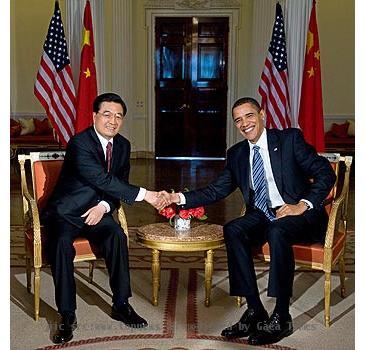4-year-old, elderly woman saved from China quake rubble after 5 days; death toll nears 2,000
By Anita Chang, APMonday, April 19, 2010
2 saved from rubble after China quake kills 2,000
JIEGU, China — Rescuers pulled a 4-year-old girl and an elderly woman alive from the rubble Monday, more than five days after an earthquake killed nearly 2,000 people in a Tibetan region of western China. Aid convoys clogged the main road into the remote mountainous area.
China Central Television said the pair had been trapped under a bed in a collapsed mud house in a village about 13 miles (20 kilometers) from the hardest-hit town of Jiegu, until rescuers dug them out Monday morning.
Relatives kept Wujian Cuomao, 68, and Cairen Baji alive by sending them food and water through gaps in the rubble with the help of bamboo poles, state broadcaster CCTV said. The report showed a team of rescuers lifting the white-haired woman onto a stretcher, throwing a thick blanket over her and putting her in an ambulance. The child was seen wrapped in a blanket in the arms of a rescuer.
The woman was in critical condition, CCTV said, while the child was suffering from heart problems due to trauma.
The death toll from the quake in Qinghai province climbed to 1,944, the official Xinhua News Agency said Monday. More than 12,100 people were hurt. At least 1,100 bodies were cremated or buried by Saturday, according to the provincial civil affairs department.
In Jiegu, thousands of Tibetan Buddhist monks picked at rubble with shovels, performing funeral rites and throwing food to survivors from the backs of trucks. Most of the work in town, however, has shifted from rescue to rebuilding, as search teams left Monday. Temperatures in the elevated area can hit lows of around 27 degrees Fahrenheit (minus 3 degrees Celsius), making the tens of thousands left homeless a major concern.
Convoys of military supply trucks were at a standstill, backed up for miles (kilometers) on the main road heading into town. At a supply depot set up on the town’s edge, huge stacks of bottled water were piled up outside a warehouse. More relief goods rumbled past mountainside hamlets where residents pitched government-provided tents along a two-lane highway that is the only connection between Jiegu and the provincial capital of Xining, the nearest big city.
Bedraggled survivors streamed from their tents and chased the trucks, the women scooping bread rolls and packets of instant noodles into the aprons of their traditional fur-lined robes.
Army trucks sprayed water on roads to reduce dust, and mobile toilets arrived — just in time as the spread of disease was becoming a concern after more than five days without running water.
The surge in aid came as President Hu Jintao, who visited the area Sunday, promised that the Communist Party and the government was doing everything they could to help the remote Tibetan region, where residents have frequently chafed under Chinese rule. Tibetan anger over political and religious restrictions and perceived economic exploitation by the majority Han Chinese have sometimes erupted in violence.
Classes resumed at Yushi No. 3 Elementary School, with hundreds of students taking lessons in classrooms set up in tents. Most wore the blue-and-white school uniforms they had on when their classrooms collapsed on Wednesday.
The official Xinhua News Agency reported that at least 66 children and 10 teachers died, but that total was likely to climb as more remained missing.
The children trooped into the tents filled with small wooden desks and chairs salvaged from the rubble.
“Confidence! Hope!” the children chanted, led by volunteers from Beijing who had organized the temporary classrooms and were planning to build permanent ones.
“On the one hand, students are coming back to resume classes. On the other hand, we are giving the students some psychological treatment after the disaster. We are trying to help them forget the disaster and not feel scared anymore,” said Danzeng Jiangcuo, a sixth-grade math teacher.
Painful reminders of the disaster were everywhere. Just behind the tent classrooms, hundreds of monks in crimson robes sat on the playground singing sutras, or prayers, for about a dozen earthquake victims whose bodies were stacked in the back of a nearby truck.
Their mournful voices mixed with the sounds of the children reciting their lessons.
“It’s Buddhist nature to help those in need,” said Cijia, a 21-year-old student from a Buddhist institute in neighboring Sichuan province 300 kilometers (185 miles) away.
The 1,200 monks from his school have no income but paid 500 yuan to 600 yuan ($73 to $87) each out of their pockets to volunteer in Jiegu.
They have been performing funeral rites twice a day, morning and night, he said.
Tags: Asia, China, East Asia, Greater China, Hu Jintao, Jiegu, Municipal Governments

